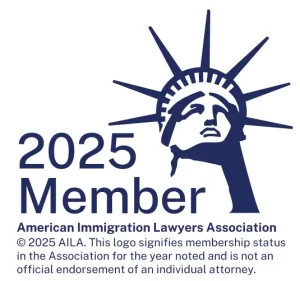
If your marriage to a U.S. citizen ended in divorce before you could jointly file Form I-751, you may still qualify to remove conditions on your green card. With the right evidence, a good-faith I-751 waiver can help you move forward legally and confidently.
In this guide, we’ll explain what a good faith waiver is, how to prove your case, what to expect from USCIS, including potential Request for Evidence (RFE) notices, and how legal guidance can make a difference.
Current Processing Times & Updates (as of August 2025)
As of August 2025, USCIS processing times for I-751 petitions vary by service center but typically range from 18-33 months. However, processing times change frequently, so check the current USCIS processing times for your specific service center before filing.
Recent USCIS policy clarifications have reinforced that good faith waiver applicants have greater filing flexibility than joint filers, making it even more important to understand your options if divorce occurs during your conditional period.
What Is a Good Faith I-751 Waiver?
A Good Faith I-751 Waiver is not a separate form—it is a type of request made within Form I-751, the petition used to remove the conditions on a 2-year marriage-based green card. Normally, this form is filed jointly by both spouses. However, if you’re divorced, you can file it alone by requesting a waiver of the joint filing requirement. You do this by checking the box on Form I-751 that states your marriage was entered into in good faith but ended in divorce or annulment.
This waiver tells USCIS that your marriage was real and not just for immigration purposes, even though it didn’t last. You must include strong evidence to support the authenticity of the relationship.
This waiver could be used for conditional permanent residents who:
- Received a 2-year conditional green card through marriage to a U.S. citizen, and
- Divorced during these 2 years.
Under 8 CFR § 1216.5(a)(1)(ii), USCIS allows individuals to file alone if:
“The marriage was entered into in good faith by the conditional resident alien, but the marriage was terminated…”
In short, your marriage must have been real, not for immigration purposes, even if it ended in divorce.
How to Prove Good Faith in an I-751 Waiver Petition
To avoid I-751 denial after divorce, USCIS needs convincing evidence that your relationship was legitimate. Strong applications include:
- Proof of a Shared Life
Birth certificates of any children.
Joint bank accounts, insurance policies, or credit cards.
Shared leases or mortgages.
Utility bills and tax returns.
Travel records, photos, and correspondence.
Signed affidavits from friends, relatives, or coworkers familiar with your relationship.
- Your Personal Affidavit
Your story is powerful. Describe how you met, the development of your relationship, major life events, your shared home, and why the marriage ended. USCIS pays close attention to this personal narrative, especially when other documentation is limited.
- Explaining Missing Evidence
If your spouse was uncooperative or controlled access to records, include a detailed explanation. USCIS understands real-life complications, particularly in difficult or imbalanced relationships.
When Should You File Your I-751 Waiver?
Timing matters, but you may have more flexibility than you think.
For joint petitions, Form I-751 must be filed within the 90-day window before the second anniversary of receiving conditional permanent resident (CPR) status. This is when both spouses typically submit the petition together.
But if you’re applying for a good-faith waiver after divorce, the rules are different, and potentially in your favor.
You Can File a Waiver Anytime You’re Eligible
According to the USCIS Policy Manual, a conditional resident requesting a waiver does not need to wait for the 90-day period. You can file:
- Before the 90-day window.
- During the 90-day window.
- After the 90-day window.
- Even after your green card expires, as long as a final removal order hasn’t been issued against you.
If you are already in removal proceedings, you can still file the waiver, but only before the immigration judge issues a final order. This creates a critical time-sensitive situation where immediate legal action is essential. In removal proceedings, your I-751 waiver can serve as a defense against removal, but the immigration court process operates on a different timeline than USCIS administrative processing. An experienced immigration attorney can help coordinate your waiver filing with your removal defense strategy to maximize your chances of success.This means once the immigration judge issues a final removal order, the opportunity to file the waiver ends, and alternative legal strategies must be considered. That’s why it’s so important to act fast and work with an experienced immigration attorney who can protect your status in time.
What Happens If You Receive a Request for Evidence (RFE)?
It’s common for applicants to receive an RFE, asking for more information. But it’s also a critical moment: one misstep could cost you your green card.
An RFE means USCIS needs additional proof before making a final decision. Typical reasons for an I-751 RFE include:
- Insufficient documentation
- Gaps in the timeline of your relationship
- Missing or unclear personal statements
- Conflicting details in affidavits or records
Responding promptly and thoroughly is crucial. A strong legal team can help you analyze the RFE, gather the right evidence, and prepare a detailed response that resolves USCIS concerns.
Does Filing a Waiver Extend Your Legal Status?
Yes. USCIS automatically extends your conditional green card for 48 months (4 years) when you properly file Form I-751. This means:
- You remain authorized to work.
- You can legally live in the U.S.
- You can continue your life without fear of falling out of status.
This extension applies while your petition is under review, even if your green card has technically expired. It gives you valuable peace of mind while your case is being processed.
Can You Travel Abroad While Your I-751 Waiver Is Pending?
Yes, but with caution. If you have properly filed Form I-751 and received your receipt notice (Form I-797) confirming the 48-month automatic extension of your conditional green card, you are generally allowed to travel internationally and re-enter the U.S.
However, travel is not recommended if:
- You’re in removal proceedings.
- Your conditional green card has already expired, and you don’t have your receipt notice or extension letter in hand.
- You have other unresolved immigration issues.
You must carry your expired green card and the I-751 receipt notice when traveling to prove your extended lawful status. But because travel during this process can be risky, especially if you’re awaiting a decision or in removal proceedings, it’s strongly advised to consult an immigration attorney before leaving the U.S.
Why Legal Support Is Key?
Filing a good-faith I-751 waiver is more than just paperwork—it’s telling your truth in a way that USCIS can understand and trust. Any mistake, inconsistency, or missed deadline can lead to denial or removal proceedings before an Immigration Judge.
At Immigration Law of Montana, P.C., we’ve helped countless clients navigate these high-stakes waivers with clarity, compassion, and precision.
Just because your marriage ended doesn’t mean your green card has to. If your relationship was sincere and your story is told clearly, you can still secure your future in the United States. Let our experienced legal team help you prepare your I-751 petition.
By Gabriela Veroes, Legal Assistant at Immigration Law of Montana, P.C.


